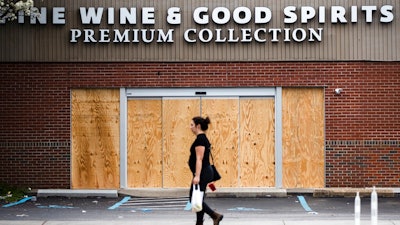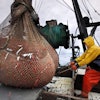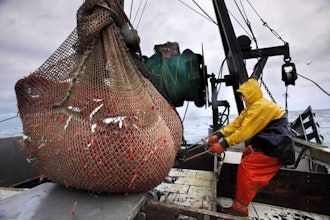
WASHINGTON (AP) — Three weeks ago, EmpireCLS was heading toward a second straight year of record business. A car service company in New Jersey, Empire couldn’t even find enough chauffeurs and office workers to meet its needs.
Now? With stunning speed, business in the United States — as well as in Europe and elsewhere — has collapsed in the face of the coronavirus and warnings for everyone to stay home. Suddenly, no one needs a chauffeur.
“We went from full throttle to 90% revenue loss in three weeks,’’ said CEO David Seelinger. “We’ve been through 9/11. We’ve seen recessions. We’ve never seen anything like this.’’
Seelinger spent last Sunday laying off 750 of his 900 employees.
“It was the most difficult day of my career,’’ he said.
Never before has the U.S. economy screeched to such a sudden, violent stop. Its shutdown has inflicted a case of whiplash on Americans who had enjoyed a decade-plus of gains from the job market, the stock market and a steady economic expansion. The economy is cratering into what looks like a deep recession. Millions will likely lose jobs by summer.
“The economy has never gone from healthy to disaster so quickly,” said Jason Furman, who was President Barack Obama’s top economic adviser and is now a professor at Harvard's Kennedy School.
“In the financial crisis,’’ Furman noted, “the housing bubble burst in 2006, the first financial tremors were in 2007 and the major financial events were spread out from February through September of 2008. What would take years in a financial crisis has happened in days in this health crisis.’’
Since the Great Recession ended in 2009, the economy has risen for a record 11 years. It hasn’t exactly been a boom. Annual growth has averaged a decent but unspectacular 2.3% since 2010. Yet the expansion has been solid and durable. Employers have added jobs for 113 straight months, the longest such streak on record.
Just two weeks ago, the government delivered a blockbuster employment report: A healthy gain of 273,000 of jobs in February. A 3.5% unemployment rate, a 50-year low.
What's more, public confidence was up. Consumers were spending. Incomes were rising. Layoffs were rare.
In just a couple of weeks, it's all ended with the shutdown of most business activity nationwide, and a destructive recession seems inevitable. Goldman Sachs expects the economy to shrink at a sickening 24% annual rate in the April-June quarter. That would be, by far, the worst quarterly drop on record. Just days before, Goldman had projected a 5% annual drop in that period.
This week, economists say the government could report that up to 3 million people applied for unemployment benefits last week, which would easily set a record. IHS Markit predicts 7 million job losses from April to June and for unemployment to shoot to 8.8% by late this year. Other economists see joblessness going much higher than that.
As investors have grasped the depth of the crisis, panic selling has set in. Since Feb. 12, the Dow Jones Industrial Average has plunged 35%, wiping out vast household wealth and likely undermining people's confidence and willingness to spend.
“I’m not sure that anyone honestly has any sense of how this ultimately resolves and on what sort of timetable,'' said Daniel Feldman, a former U.S. diplomat who counsels corporations for the law firm Covington & Burling.
Policymakers are straining to help. The Federal Reserve has slashed its benchmark interest rate to near zero and is trying to ensure that companies maintain access to the short-term credit they need for payrolls and other expenses. Congress and the White House are preparing an enormous stimulus program that includes sending checks to households and ensuring some paid sick and family leave.
Typically, economists don’t recognize a recession until long after it's begun, the warning signs apparent only in hindsight.
“Never in the course of my career have I known the week a recession started,’’ said Diane Swonk, chief economist at the accounting and consulting firm Grant Thornton, who calculates that the downturn began in the first week of March as the economy all but locked down.
At Stuyvesant Plaza, an office complex and shopping center outside Albany, New York, sales from shops, restaurants and fitness centers had posted double-digit increases in January and February.
And then "the world turned upside down," said Ed Swyer, president of the plaza.
Now, he's waiving rent for two weeks for his 60 tenants, hoping to help them survive. The restaurants, in particular, are suffering from New York state’s order to close all eateries except take-out and delivery. Swyer is offering no-interest loans to some of the businesses.
“I feel like it’s a bottomless pit, and we just don’t know how bad it is and what the duration is,” he said.
A few weeks ago, said Nicholas Calio, CEO of Airlines for America, an industry association and lobbying group, airliners were running 85% to 100% full. Now, their occupancy rates are 15% to 20%. Recently, he traveled on a plane with just 15 passengers.
And until the virus paralyzed the economy, Samantha Martin’s PR business was soaring. At Toy Fair, an industry expo — “my Super Bowl” — "we were bopping up and down aisles like nothing was happening.”
Then jittery clients started sending emails. PR and marketing expenses are often the first budget item that struggling companies cut. Martin offered clients discounts. And she asked her 16 staffers to take a 25% pay cut.
Most of her clients are staying put, for now. But Martin says she now wakes up with a knot in her stomach.
The shutdown of restaurants has stifled sales at D’Artagnan, a wholesaler of high-end meat products that supplies the food service business.
“We’re going to go from 8% growth to a huge decline,” said Andy Wertheim, president of the company in Union, New Jersey.
Automakers, too, are reeling. Until last week, the research firm Cox Automotive was forecasting 16.6 million new-vehicle sales this year, down only slightly from 2019. Now, said Michelle Krebs, a Cox analyst, it appears sales could drop as low as 14 million.
“Things are changing by the hour,” said Jeff Aznavorian, president of Clips & Clamps, a Michigan auto supplier.
Orders and shipments might hit zero next week. Aznavorian worries about his cash flow. Even when sales eventually rebound, he won’t be collecting customer payments for months. He's having trouble sleeping.
“I feel the freight train coming at me,’’ he said.
For now, many U.S. households are coping — working from home and still holding on to jobs. Some of them may even be managing to save money, "which will give us more resources later,’’ said Scott Hoyt, senior director of consumer economics at Moody’s Analytics.
Yet for much of America, the picture is bleak. Roughly 82 million people — three-fifths of the U.S. workforce — are hourly employees. Most of them won't be paid if they don't work. They have rents to pay and food to buy. And it's still unclear what financial aid the federal government will provide.
“They’re scrambling and at financial risk,” Hoyt said.
Nevin Muni, a part-time sales associate for T.J. Maxx in Astoria, Queens, was barely managing even before the store announced it was shutting down. The store had been cutting her hours because of a plunge in customers amid the virus crisis. Her manager called Thursday to tell her the store would close until further notice, with no guarantee that she'll be recalled to work.
“I’m so worried because I don’t know long this is going to last,” said Muni, who plans to apply for unemployment benefits.
Maggie Pouncey, owner of Stories children’s bookshop in Brooklyn, had been looking toward celebrating her store's four-year anniversary with a big bash in April on Independent Bookstore Day. She'd been hoping to begin using a truck to take books and services to schools around the city.
The bash is off. Pouncey canceled all her programming — the story times, the writing workshops, the author readings — that is vital to her business in the age of Amazon.
She'll open her shop for pick-up orders one final time before closing — temporarily, she hopes. And she's told customers and her staff that she can't guarantee the store will survive the crisis.
“If it’s one month of this, that’s one thing," Pouncey said "If it’s four months, it’s another.”






















